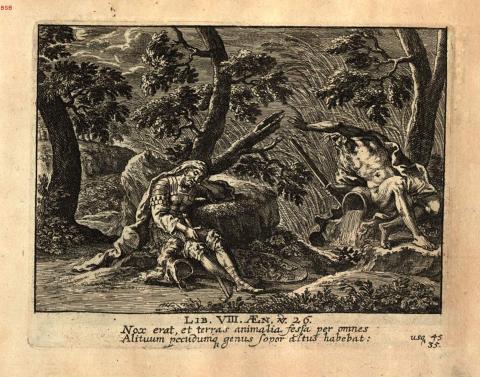CORE VOCABULARY
ō: (interj. expressing joy, grief, astonishment, desire, or indignation), O! oh! ah! w. voc., 2.281, et al.; w. sī and the subj., oh that, 11.415; sometimes placed after the word to which it relates, 2.281.
serō, sēvī, satus, 3, a.: to sow or plant; with indefinite object omitted, 6.844; scatter, spread, disseminate, 12.228.
Trōiānus, a, um: adj. (Trōia), Trojan, 1.19; subst., Trōiānus, ī, m., a Trojan, 1.286; pl., Trōiānī, ōrum, m., the Trojans, 5.688.
revehō, vexī, vectus, 3, a.: to carry, convey or bring back, 8.37.
Pergama, ōrum, n., Pergamum, ī, n., and Pergamus (-os), ī, f.: 1. The citadel or walls of Troy, 3.87; Troy, 4.344, et al. 2. The Trojan citadel of Helenus in Epirus, 3.336.
exspectō, āvī, ātus, 1, a. and n.: to look out for; to expect, wait for, 4.134; await, 6.614; tarry, linger, delay, 4.225; p., exspectātus, a, um, much looked for; much desired, 2.283; expected, trusted.
solum, ī, n.: the bottom or ground of anything; soil, earth, ground, 1.367, et al.; land, 3.698; foundation, 10.102; the water beneath a ship, as its support; the water, sea, 5.199; support, table, 7.111.
Laurēns, entis: adj. (Laurentum), of Laurentum, the ancient capital of Latium; Laurentine, Laurentian, 5.797, et al., subst., Laurentēs, um, pl. m., the Laurentians, 7.63, et al.
Latīnus, a, um: adj. (Latium), of Latium; Latin, 1.6, et al.; Latīna, ae, f., a Latin woman, 12.604.
absistō, abstitī, 3, n.: to stand off or away from, followed by the abl., alone or with prep.; withdraw from, 6.259; fly, dart from, 12.102; (with infin.), desist, cease, 6.399; (alone), stop, cease, 1.192.
Penātēs, ium, m.: gods of the household; hearth-, fireside gods, 2.514, et al.; tutelary gods of the state as a national family, 1.68; (fig.), fireside, hearth, dwelling-house, abode, 1.527. (penus)
nēve or neu: (conj.), or not, and not, nor, neither, w. subj. or imperat., 7.202; ne — neu (nēve), that not — nor, lest — or lest, 2.188.
minae, ārum, f.: the projecting parts; points, pinnacles, battlements, 4.88; threats, menaces, 4.44; perils, 6.113; curses, 3.265. (cf. -mineō in immineō, etc.)
tumor, ōris, m.: a swelling; of the mind, passion, indignation, resentment, 8.40. (tumeō)
concēdō, essī, essus, 3, a. and n.: to retire; come away, come, 2.523; go away, depart, 2.91; subside, come to an end, terminate, 8.41; allow, yield, grant, concede, 5.798; give up to, abandon, 7.305.
vānus, a, um: (adj.), containing nothing, empty; devoid of truth, deceitful, false, 1.352; unavailing, 8.259; groundless, 4.12; ignorant, 10.631; subst., vāna, ōrum, n., useless things, 2.287; (adv.), vāna, vainly, 11.854.
lītoreus, a, um: adj. (lītus), pertaining to the seashore; on the shore; very rarely, on the river bank, 3.390; of the shore, seashore, 12.248.
īlex, icis, f.: the holm-oak, scarlet oak, ilex, 6.180.
sūs, suis, c.: a hog, swine, 1.635; sow, 3.390.
trīgintā: (num. adj., indecl.), thirty, 1.269.
fētus, ūs, m.: a bearing or breeding; the young; the new swarm, 1.432; litter, 3.391; of vegetable products, growth, sprig, shoot, 6.207; fruit; product.
ēnītor, nīxus or nīsus sum, 3, dep. n. and a.: to struggle forth or upward; to bring forth, bear offspring, 3.327.
recubō, 1, n.: to be lying back or down; recline; be extended; lie, 3.392.
circum: (adv.), about, around; (prep. with acc.), around, about.
ūber, eris: (adj.), fruitful, fertile, 3.106. (compar., ūberior; superl., ūberrimus), (ūber)
ter: (num. adv.), thrice, three times, 1.94, et al. (trēs)
dēnī, ae, a: (adj. num. distrib.), ten by ten; ten each; (as cardinal), ten, 1.381.
redeō, īvī or iī, itus, īre, irreg. n.: to go, come back, return; retreat, 9.794.
Ascanius, iī, m.: Ascanius, son of Aeneas, and traditional founder of Alba Longa, 1.267.
cognōmen, inis, n.: a name common to a family; a surname; name, 1.267.
Alba, ae, f.: Alba or Alba Longa, a town on the Alban hills in Latium, from which Rome originated, 1.271.
incertus, a, um: (adj.), uncertain, 2.740; wavering; fickle, 2.39; doubtful, 3.7; undistinguished, base, 11.341.
īnstō, stitī, 1, n.: to stand on or upon; w. dat., acc., inf., or alone; w. dat., to stand on, 11.529; stand or hang over, 10.196; (w. acc.), to work at, ply work upon, 8.834; (w. inf.), urge on, press on, 1.423; persist, 10.118; (alone), to follow up, press on; pursue, 1.468; struggle, 12.783; be near at hand, approach, threaten, 12.916; to be urgent, important, incumbent, 4.115.
expediō, īvī or iī, ītus, 4, a.: to make the foot free; to extricate, disentangle; bring forth, get ready, 1.178; seize, use, 5.209; serve, 1.702; unfold, describe, disclose, 3.379, 460; declare, 11.315; pass. in middle sig., make one’s way out, escape, 2.633. (ex and pēs)
paucus, a, um: (adj.), small, little; pl., paucī, ae, a, few, a few.
Arcas, adis, m.: an Arcadian, 10.452;(adj.), 11.835.
ōra, ae, f.: a margin, border, 12.924; coast, shore, 3.396; region, 2.91; rim, extremity, 10.477; pl., outline, compass, 9.528.
Pallās, antis, m.: 1. A king of Arcadia, great-grandfather of Evander, 8.51. 2. Pallas, son of Evander, 8.104, et al.
Euander (-drus, 8.100; Ēvander, -drus), drī, m.: Evander, an Arcadian prince, son of Carmentis, and king of Pallanteum on the Tiber, 8.52.
dēligō, lēgī, lēctus, 3, a.: to choose from; choose, 2.18. (dē and legō)
proavus, ī, m.: a great-grandfather; sire, ancestor, 3.129.
Pallantēum, ī, n.: the city of Evander on the Palatine, 8.54, et al.
adsiduē: adv. (adsiduus), persistently, perpetually, constantly, 4.248.
foedus, eris, n.: a treaty, league, alliance, freq., truce, 5.496; side or party, 12.658; covenant, contract, 4.339; laws of hospitality, hospitality, 10.91; pledge, love, 4.520; law, term, condition, rule, 1.62. (rel. to fīdō, trust)
rēmus, ī, m.: originally steering-oar; an oar, 1.104.
subvehō, vexī, vectus, 3, a.: to carry up; (pass.), ride up, ascend, 11.478; 5.721; sail, float up, 8.58.
age, agite: (imperat. of ago), onward! away! come on!
Iūnō, ōnis, f.: Juno, the Sabine and Roman name for the wife and sister of Jupiter, daughter of Saturn, 1.4, et al.; Iūnō īnferna, the Juno of the lower world, Proserpine, 6.138.
rīte: (adv.), properly, fitly, rightly, 6.145; justly, meetly, 3.36; well, 3.107. (rītus)
supplex, icis: adj. (supplicō, beseech), kneeling, entreating, suppliant, 3.439; subst., supplex, icis, c., a suppliant, 2.542.
persolvō, solvī, solūtus, 3, a.: to loosen completely; set free; free one's self from obligation; pay, render, give, return, 1.600, et al.; sacrifice, offer, 5.484.
stringō, strīnxī, strīctus, 3, a.: to draw tight, bind; of a sword, draw out, draw, 2.334; graze, touch lightly, go near, 5.163; trim up, cut, 1.552; (fig.), touch the mind, 9.294.
pinguis, e: (adj.), fat, 1.215; well-fed, 1.635; fertile; reeking, 4.62; fat or rich with victims, 9.585.
culta, ōrum, n.: plowed fields; fields.
secō, secuī, sectus, 1, a.: to cut, freq.; cut off, 4.704; engrave, carve, 3.464; cut through, cleave, 5.218, et al.; of the channel of a river, 8.63; sail through, pass, 8.96; speed, 6.899; shape out mentally, form, 10.107.
caerulus, a, um: (adj.), dark blue, 2.381; sea-colored, azure, 5.819; dark; black, 3.64; subst., caerula, ōrum, n., the dark blue waters; the sea, 3.208.
Thӯbris, idis, m.: an ancient king of Latium, 8.330.
celsus, a, um: adj. (cellō, rise), high, lofty, 1.56, et al.
exeō, īvī or iī, itus, īre, irreg. n. and a.: to go out or forth, 1.306; come out, 5.492; overflow, burst forth, 2.497; avoid, elude, 5.438.


